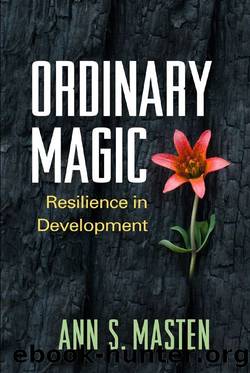Ordinary Magic: Resilience in Development by Ann S. Masten

Author:Ann S. Masten [Masten, Ann S.]
Language: eng
Format: epub
ISBN: 9781462517275
Publisher: Guilford Publications
Published: 2014-08-07T00:00:00+00:00
GENETIC AND EPIGENETIC RESEARCH
As indicated throughout this volume, new tools and knowledge in molecular genetics have precipitated growing interest in the genetic and epigenetic processes that may be involved in resilience (Cicchetti, 2013; Feder et al., 2009; Kim-Cohen & Gold, 2009; Kim-Cohen & Turkewitz, 2012; Raby & Roisman, 2013; Russo et al., 2012; Rutter, 2006). This work, both in theory and empirical research, has taken a variety of forms. These include studies of specific genes or polymorphisms of genes with protective effects in particular contexts, such as the gene for alcohol sensitivity reducing the risk for alcohol dependence. There also are studies of moderating effects of individual genes or gene clusters on outcomes in extreme adversity situations, including a growing body of research indicating moderating effects of the serotonin transporter gene, dopamine receptor, and other genes in contexts of severe child maltreatment (Cicchetti, 2013). Some findings suggest moderating effects of genes on protective systems, such as the moderating role of the oxytocin receptor gene on the role of social support in stress responses, described above. Genes indexing sensitivity to experience or plasticity are under study as moderators of response to intervention, either in isolation or in combination, including the serotonin transporter, dopamine receptor, and brain-derived neurotrophic factor (BDNF). There is intriguing evidence that variations in the BDNF gene moderate effects of stress or interact with other genes to confer vulnerability or protection. For example, BDNF-moderating effects were found in a recent study of adolescents who experienced Hurricane Ike (La Greca, Lai, Joormann, Auslander, & Short, 2013). There is research on the protective effects of telomeres for DNA integrity or longevity and the effects of chronic stress on telomeres, noted above. The effects of parenting quality on gene expression are under widespread investigation, including the effects of parenting quality on methylation of specific genes implicated in adaptive behavior, such as the glucocorticoid receptor (Hackman et al., 2010; Zhang, Labonté, Wen, Turecki, & Meaney, 2013).
Evidence mounts that diverse but widely observed gene × environment effects suggesting “maternal buffering”—protective effects of competent parenting—for human children, rat pups, and rhesus monkeys (for example) in the context of genotypes or biological markers that confer risk for behavioral problems may be mediated by epigenetic effects (Cicchetti, 2013; Meaney, 2010; Suomi, 2011; Rutter, 2012b; Zhang et al., 2013). New studies also have shown that genetic variations linked to differential sensitivity may moderate response to intervention in prevention experiments (e.g., Bakermans-Kranenburg, van IJzendoorn, Pijlman, Mesman, & Juffer, 2008; Brody, Beach, Philibert, Chen, & Murry, 2009).
It is now conceivable that interventions could be personalized or tailored at a genetic level, akin to genetically personalized chemotherapy (Brody, Chen, & Beach, 2013). However, as knowledge expands, it becomes increasingly clear that elucidating genetic processes involved in resilience is a complex undertaking. The science is exciting but just getting under way.
Download
This site does not store any files on its server. We only index and link to content provided by other sites. Please contact the content providers to delete copyright contents if any and email us, we'll remove relevant links or contents immediately.
Should I Stay or Should I Go? by Ramani Durvasula(6774)
Why We Sleep: Unlocking the Power of Sleep and Dreams by Matthew Walker(5633)
Fear by Osho(4082)
Flow by Mihaly Csikszentmihalyi(4043)
Rising Strong by Brene Brown(3775)
Why We Sleep by Matthew Walker(3765)
Too Much and Not the Mood by Durga Chew-Bose(3689)
How to Change Your Mind by Michael Pollan(3667)
The Hacking of the American Mind by Robert H. Lustig(3572)
Lost Connections by Johann Hari(3446)
He's Just Not That Into You by Greg Behrendt & Liz Tuccillo(3297)
Evolve Your Brain by Joe Dispenza(3040)
What If This Were Enough? by Heather Havrilesky(2943)
Resisting Happiness by Matthew Kelly(2881)
Crazy Is My Superpower by A.J. Mendez Brooks(2854)
The Courage to Be Disliked by Ichiro Kishimi & Fumitake Koga(2789)
The Book of Human Emotions by Tiffany Watt Smith(2765)
Descartes' Error by Antonio Damasio(2725)
In Cold Blood by Truman Capote(2676)
